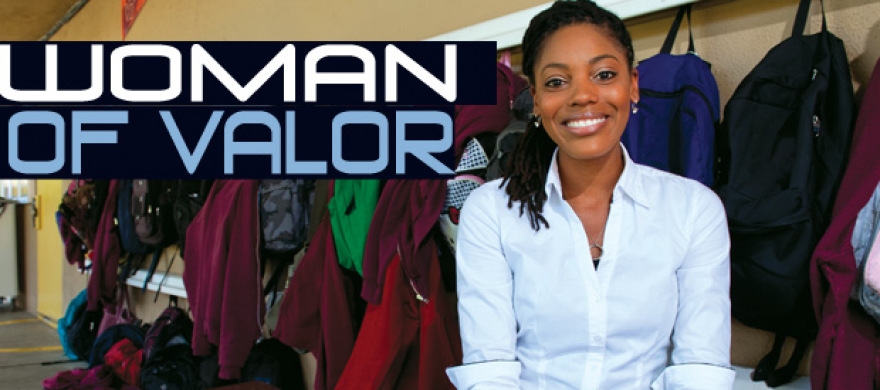"I’ll never forget what it means to be from an urban environment," reflects Jessica Boro (MS ’09). Brought up in South Los Angeles, Boro was raised by a mother who insisted on sending her daughter to small, private schools that represented their communities, yet focused heavily on a solid education, “so that when you moved on, you were able to bring other people up from where you’re from,” she says.
As a young student Boro noticed the stark contrast between her positive school experiences and those of her public school friends, and couldn’t help but sympathize with her peers as they complained of overcrowding and limited classroom attention. The observation sparked a passion—and later, a career—dedicated to improving the schools in her own neighborhood and beyond. “I just wanted to give back to communities that were like mine,” she explains.
Following years of teaching, in June 2009 Boro signed on as head of instruction at Valor Academy, a fifth-to-eighth-grade- level charter school in Arleta, California, that focuses on preparing urban students for acceptance to top universities and making sure that their behavioral goals match their academic ambitions. She soon found that her values aligned precisely with the school’s, especially its “No excuses” policy.
“So often people will blame where students come from or the fact that they’re second-language learners or that they live in poverty,” Boro says. “I think that if students are given the correct tools and the opportunity, they can succeed no matter where they’re from.”
The philosophy propelled Boro from student to teacher, and ultimately administrator, a step she admits to making more hesitantly.
“I just didn’t see it in my future, because I didn’t want to be disconnected from the students.”
After graduating from Spelman College in 2002, Boro joined Teach for America and served at LaSalle Avenue Elementary School near Inglewood, California, where she stayed two years longer than her corps commitment required. During that time, she also earned her National Board Certification teaching credential. Putting her graduate degree goal on hold, Boro moved on to Watts Learning Center Charter School, during which time she realized her heart was at the head of the classroom. “There were no interruptions from 8 a.m. to 3 p.m.—and I fell in love with it,” Boro recalls.
She reluctantly followed the suggestion of her mentors and joined the educational Leadership and Administration Program at the Graduate School of Education and Psychology in 2008. Then, “I fell in love with my professors and my colleagues, and at the end of the program I decided that I was going to take a risk and apply to be a school leader.”
Between leaving her first charter school placement at Watts Learning Center and completing her administrative program at Pepperdine, Boro took a year off from the classroom to work solely on helping teachers construct their curriculum and differentiate instruction. To supplement her income, she became a substitute teacher, a time Boro refers to as “a year of anthropological study,” when she traveled to different campuses, worked with various teachers and grade levels, and got a sense of what works in the classroom and what doesn’t. It was then that she realized her passion for administration and promoting exceptional educational opportunities to students in urban communities. She found the perfect prospect in Valor, which contacted and recruited her just two weeks after she submitted her resume to the Teach for America alumni resource book.
“I think that it’s important for students to have the opportunity to access their goals,” Boro asserts, explaining Valor’s pursuit of developing purpose-driven students. “In order to access your goals, you have to have a strong educational foundation.” At Valor, she is committed to making sure that students are exposed to a diverse learning environment and highlighting the positive opportunities and outcomes that arise from urban areas.
Beyond refining curricula and academic programs, Boro has also sought to elevate the pride that community members feel about their neighborhood, “so they don’t always have to hear about the shootings or the gang activity or the robberies,” she explains. Last year, with Boro’s help, Pepperdine’s Waves of Service movement partnered with Valor to provide students opportunities to realize their academic future while establishing their name in the community.
In order to encourage students to look ahead to college, each classroom at Valor is named after a local university; three are named for Pepperdine. “They spark this love of the University, not just academically, but also socially,” remarks Waves of Service coordinator Annalee Shelton (and current GSeP master’s candidate), who explains that the students remain in their designated classrooms throughout their time at Valor. “Everything is centered around what they’re going to be in 10 years. It’s part of what makes Valor so special. The kids aren’t only looking to graduate from eighth grade: they want to graduate from their university and leave with a deep-seated connection to that university.”
From planning field trips to the Malibu campus for a performance at Smothers Theatre, to inviting members of the Pepperdine community to speak to classrooms about their career paths, Boro helps bring the Pepperdine community together in service to the school.
Today she continues as a student at Pepperdine, pursuing her doctorate in education with an emphasis on charter schools and parent involvement. “I think, overall, the goal is to push traditional public and charter schools to make sure that we stick to our mission and vision and give the students exactly what we said that we would,” she asserts. “As long as our goals are pushing us towards bettering ourselves and remain aligned with the mission, that's what is best for our students.”
